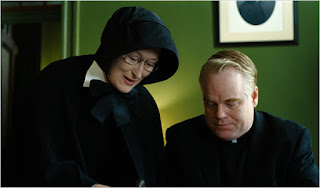Faith in Film — Doubt
This week we're looking at the fantastic film "Doubt," released in 2008 and based on the stage play by John Patrick Shanley.
Discussion Questions:
1. Did this movie work for you? Why or why not?
2. What should be the Christian response to the concept of doubt?
3. What makes gossip so destructive to all those who are touched by it?
4. When sharing the Gospel and presenting Christianity, how should we try to reach people?
Thoughts:
“Doubt” was one of the finest and most over looked films of 2008. In a crowded class of contenders, the film was recognized for its performances. “Doubt” earned five Academy Award nominations, winning none. However, Hoffman was nominated for Best Supporting Actor, Street for Best Actress, Adams and Davis for Best Supporting Actress, and writer/director John Patrick Shanley was nominated for Best Adapted Screenplay.
For Shanley, making “Doubt” was very personal. It is based on his stage play, which had a long and successful run on Broadway. The play opened in 2004 and ran for 525 performances, earning the Pulitzer Prize for Drama and a Tony Award as the Best Play. It is called “Doubt, A Parable,” and that is a fairly accurate representation of the crux of the story. The film retains the basic story and much of the original dialogue from the stage play thanks to the personal adaptation from Shanley.
The interesting thing about this film is the story. There are some elements to this story which garnered a great deal of attention — a story that touches on the sex abuse scandals that have hurt the Catholic Church. However, that is not the focus for Shanley. He does not definitively answer the question of what happened in this story, nor does he seem interested in that answer. The film is about a clashing of ideologies, and the lengths to which some will go to prove their point.
Instead, this is a fascinating look at theology in three areas. First is the concept of doubt, fitting to the title. The film begins with a homily from Father Flynn (Hoffman) about doubt, and that begins the conflict between him and Sister Alyousis (Streep), who can't make room for the idea of doubt in her rigid, structured life. You see, she turned to the church and took up the habit as a means of dealing with the struggles in her life after her husband was killed. The church provided purpose, meaning, and structure, and that's what she sees of the church — a rigid discipline. When Father Flynn comes in preaching a different ideal — embracing doubt and approaching theology from love — it conflicts with what she's looking for.
The film also has some interesting things to say about gossip and about how we convey the Gospel. While many targeted this as a story that puts the Catholic sex abuse scandals under a microscope, I think that's selling this fascinating story short.




Comments
Post a Comment